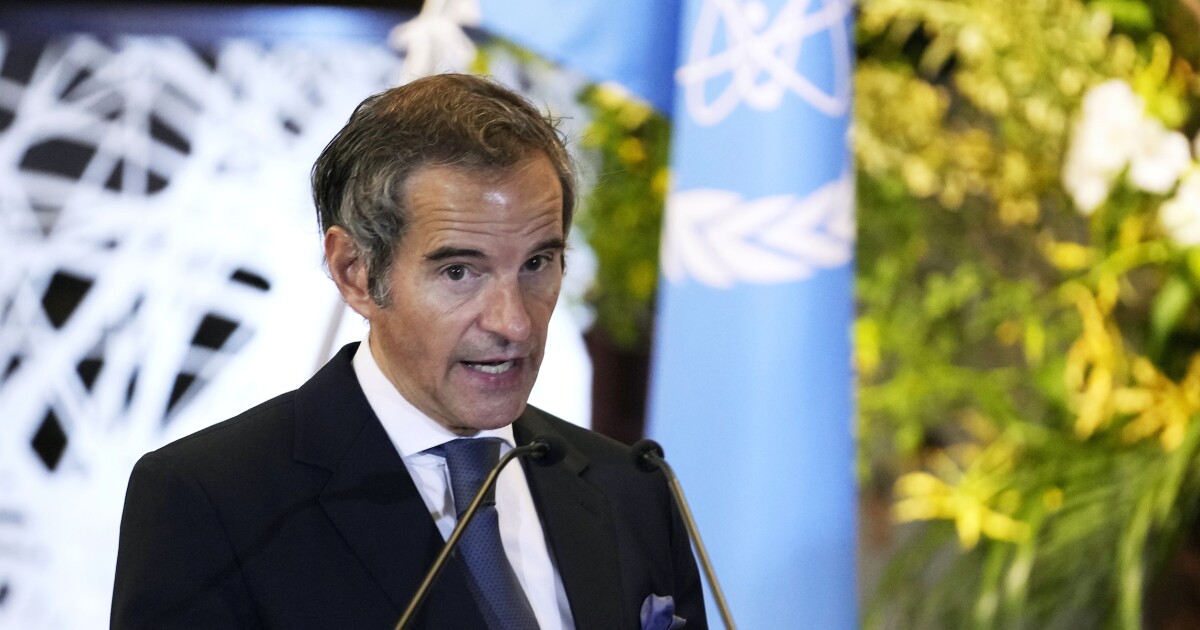

China seeks to exploit the substantial transition toward the use of nuclear energy that a leading international watchdog says Western economies need to make.
Chinese officials think they have a major advantage over U.S. and European nuclear companies over the coming years, enabled by the fear of nuclear energy that has predominated as of late in Western societies. A combination of climate change anxieties and the dire consequences of financing Russian President Vladimir Putin’s invasion of Ukraine through the purchase of Russian natural gas has renewed Western interest in nuclear energy, potentially shortening the window of opportunity for trans-Atlantic allies to close that gap.
“If we are to meet our climate goals in the coming three decades, nuclear capacity will need to more than double,” International Atomic Energy Agency Director General Rafael Grossi said Monday at the United Nations headquarters in New York. “It’s clear nuclear energy is gaining public acceptance. Some 30 countries are at various stages of considering, or planning, to build nuclear energy programs.”
That changing attitude presents an opportunity for China, according to officials and analysts involved in the Chinese nuclear industry.
US AND JAPAN MOVE TOWARD FOUNDING OF ‘ECONOMIC NATO’ TO COUNTER CHINA
“The sector has been wiped out in many European countries and the US. They don’t have the technicians and the technology either,” China Electric Power Promotion Council’s Wang Yingsu, the organization’s secretary general for nuclear power, said in remarks translated Saturday by the South China Morning Post. “Countries wishing to develop nuclear energy have become very dependent on China, which offers state-of-the-art technology at a lower price.”
Western countries have been working to shut down their nuclear plants, particularly in the wake of the disaster caused by an earthquake and tsunami in the vicinity of the Fukushima Daiichi Nuclear Power Plant in Japan.
“It’s fair to say that both the U.S. and Europe need to be a lot more aggressive about getting into the nuclear energy business,” the Heritage Foundation’s James Carafano told the Washington Examiner. “Nuclear power is … going to be part of the future energy mix, and so people got to get their head back in the game.”
The most consequential decision to exit the nuclear energy sector took place in Berlin, after the Fukushima disaster. Then-German Chancellor Angela Merkel, who had previously declared “it absurd to shut down technologically safe nuclear power plants that don’t emit CO2,” hastened to reverse herself. German lawmakers voted to scuttle their nuclear power plants by the end of 2022. In that context, Merkel forged ahead with a 2015 deal to build a Nord Stream 2 pipeline to connect Germany to Russia’s natural gas reserves, despite Putin’s thinly veiled invasion of Ukraine in 2014.
“It’s true, of course, that we now face the very ambitious and challenging task of completing the energy transition while phasing out coal and nuclear power,” Merkel said in November 2021, shortly before ending her long tenure as chancellor. “We in Germany believe — across party lines — that nuclear energy should not be classified as being as clean as wind and solar energy. … It is natural gas that must be classified as a stopgap technology.”
Just three months later, Putin launched a full-scale offensive to overthrow the Ukrainian government. U.S. and European officials mobilized to impose severe economic sanctions on Russia as punishment, but the Western need for Russian natural gas has given Putin a precious revenue stream to nourish his flagging economy.
“The conversation in Europe is changing,” Grossi said. “Some people ask whether nuclear can be built quickly enough and whether governments are willing to make the investment. The answer is yes; because it has been done before. Forty percent of the nuclear power plants we still rely on today were built in the fast and sizable response to the oil shocks of the 1970s.”
And the Chinese nuclear industry hopes that a substantial portion of that investment will flow through deals with its companies. “It is critical to consider the global market [for nuclear power] in advance and study the demand from developed countries,” China’s National Development and Reform Commission’s Zhou Dadi said, per SCMP.
Still, Western public opinion has soured on China in recent years due to Beijing’s censorship of early warnings about the coronavirus pandemic and the communist regime’s use of economic clout to punish Western countries that take political positions it dislikes.
CLICK HERE TO READ MORE FROM THE WASHINGTON EXAMINER
“How we measure risk about China has changed significantly over the last decade,” Carafano noted. “The fact [is] that China may be a low-risk provider of technology, [but] it’s equally a higher geopolitical risk.”







